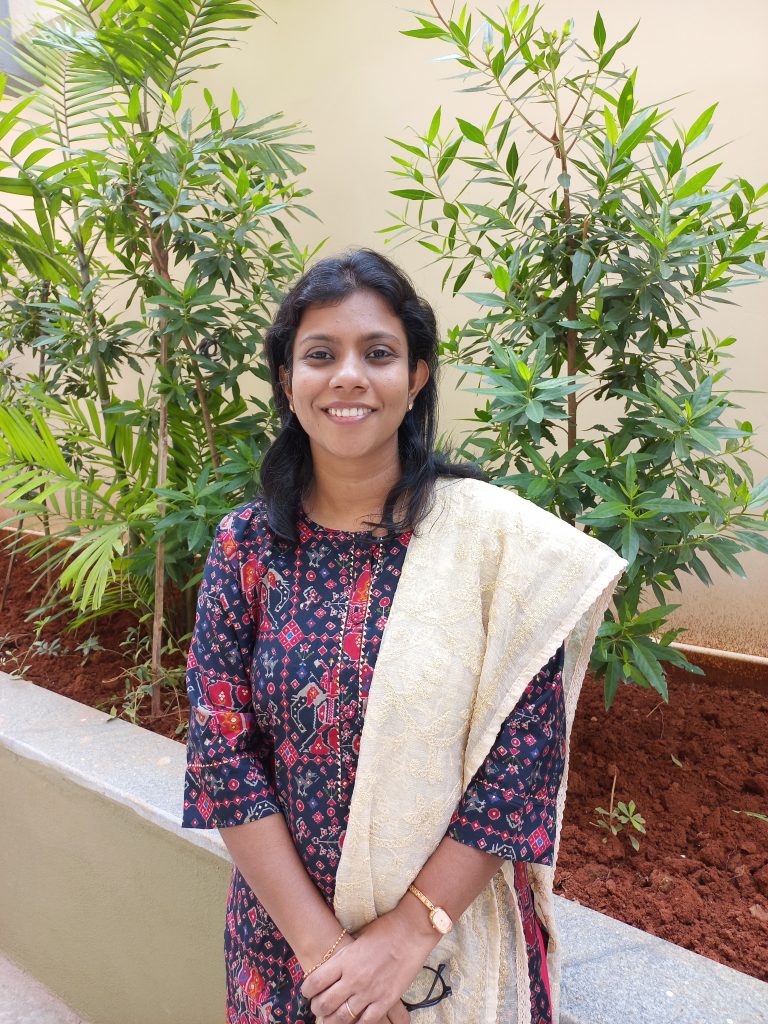Meet Our New Faculty | Dr. Betsy Rajasingh
June 21, 2022
We are pleased to welcome Dr. Betsy Rajasingh who joins NLSIU as Assistant Professor of Law for the Academic Year 2022-23. Prior to joining NLSIU, she was Assistant Professor at the Saveetha School of Law, Chennai, where she taught courses on Intellectual Property Rights Law, Environmental Law, Constitutional Law and Torts. She also worked as a Legal Executive with Joyce A. Tan & Partners, Singapore, and as a Legal Associate with HB & Partners, Chennai. Besides legal research and drafting, she assisted in presenting cases in the High Court of Madras and the lower courts on issues pertaining to property law, contract law, matrimonial disputes, intellectual property law and employment law.
In the July 2022 term, Betsy will be teaching students of the BA LLB (Hons) programme. In this interview, we asked her to share about her interests and her work.
 Can you tell us more about yourself/your background?
Can you tell us more about yourself/your background?
I am from Chennai, where I did my schooling before graduating with a BA in English Literature from Stella Maris College. Subsequently, I entered law school topping the entrance exam conducted by Tamil Nadu Dr. Ambedkar Law University and completed my BL at Dr. Ambedkar Government Law College.
I then pursued my LLM in Intellectual Property and Technology Law as a Miranda Fellow at the National University of Singapore (NUS). NUS largely shaped my interest in intellectual property (IP) law, which led to pursuing and completing my PhD in the area of digital copyright law as UGC Junior Research Fellow at the Tamil Nadu Dr. Ambedkar Law University.
Hailing from a family of teachers, with both my parents as well as their parents being teachers, I have come to realise my passion for teaching in the invigorating and liberating atmosphere of a classroom, which provides the possibility for sustained learning and continual growth.
What are your main areas of teaching? How did your interest in these areas begin?
Intellectual property law has been my principal area of teaching and research. IP has piqued my interest since law school days. The courses I studied under eminent Professors at NUS solidified my interest in the area of IP and development. In particular, it helped me recognize the need for IP policy and regulation that suit domestic needs; a one-size-fits-all approach with relation to IP is not appropriate for countries from disparate socio-economic backgrounds.
Apart from IP, I have enjoyed teaching Constitutional Law, Environmental Law and Torts.
Your thoughts on starting your teaching journey at NLS? What are your plans ahead?
The opportunity to teach at NLS is a lifetime high as it provides the chance, in the words of Dr. Kalam, to ignite bright young minds. Considering NLS has consistently generated leading legal scholars and practitioners in the country since its establishment, the ability to engage, deliberate, debate, and essentially learn with the future leading legal minds of the country will most certainly be for me, as for any teacher of law, a wholly fulfilling experience. Also, I am sure NLS will provide the platform for me to not just teach, but further explore my research interests in the area of IP law by learning from, and with distinguished superiors, peers and students on campus.
Could you please highlight your key projects/publications?
The balance that IP law tries to achieve between the private rights guaranteed to IP right holders and the public interest it sets to achieve by prescribing limits and exceptions to the private rights has been an area of concern; this is a concern especially in recent times when developed countries have been transposing stronger IP laws to countries across the globe. It has particularly been concerning for developing and least developed countries as they ought to ensure their IP laws not only prescribe and protect private rights, but make sure public interest needs relating to access are met.
As mentioned earlier, this has been one of the broad areas of research interest, which led me to study the implications of technology and law on the limits and exceptions to copyright relating to education for my PhD. The study further resulted in the publication of my book titled ‘Digital Copyright Law – A Comparative Study of the Limitations and Exceptions Relating to Education‘ with Thomson Reuters. I have also published in the Journal of Intellectual Property Law and Practice, where I have been a peer reviewer as well.
I am currently studying the law relating to geographical indications (GI) and its effect on securing the interests of the local communities that actually produce the GI, and look forward to furthering the research work here at NLS.

